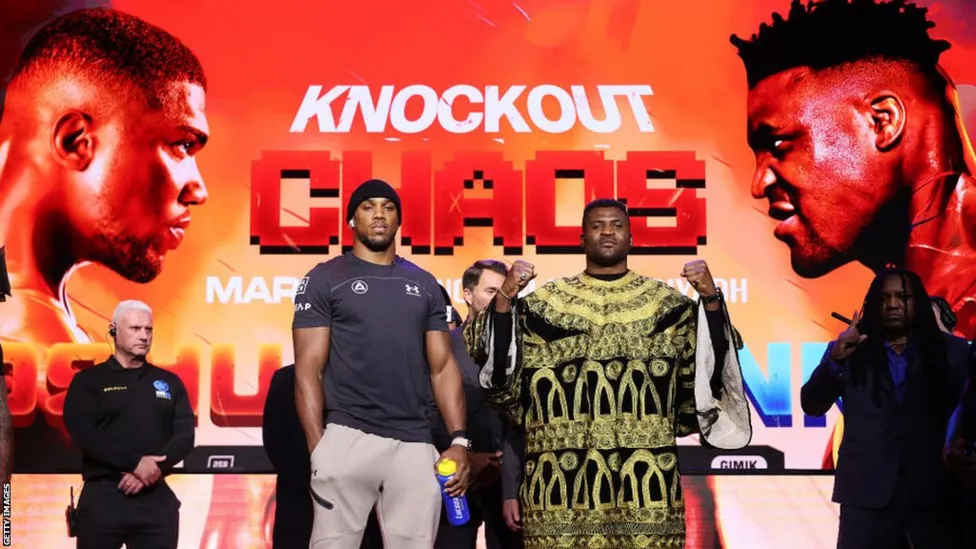Joshua ready for Ngannou
Fighting is in Anthony Joshua’s “bloodline”, according to his cousin Raymond Ajakaye, who lives in the Nigerian town of Sagamu that is the ancestral home of the Joshua family.
The town is expected to grind to a halt on Friday when hundreds of people will assemble to watch special screenings of the British boxer’s heavyweight contest against Cameroon’s Francis Ngannou – to cheer on the man they see as their own.
“It runs in the family, we’re all tough people, from my grandad, my uncles and his dad,” Ajakaye tells BBC Sport Africa.
“We fought through a lot. This is where I would think he got the [boxing] gift from.”
Located near Lagos in south-west Nigeria, Sagamu has a population of around half a million people.
Like the country as a whole, that population skews towards the younger age range, meaning many youngsters have found inspiration in Joshua’s family heritage and his success in the ring.
Such has been his impact, the town has its own Anthony Joshua Fan Club, with thousands of followers on social media, while a street has also been renamed in honour of the 34-year-old Olympic and two-time world heavyweight champion.
READ ALSO: Continue to support Super Eagles, Peseiro urges…
“The road was called Cinema Road for many years but it was changed by the government in recognition of his [Joshua’s] achievements,” says Ajakaye.
“We have an office set up here to become a meeting point for all his fans.”
Not only does the road serve as a meeting place for acolytes, but there are also plans in place to build a gym to hunt for the next AJ.
A local primary school is one of the buildings found on Anthony Joshua Way, the road named after the British boxer in Sagamu
Anthony Oluwafemi Olaseni Joshua was born in the UK in October 1989 to a Nigerian mother and a father of Nigerian and Irish descent.
Although he has always fought under a British flag, he spent part of his childhood in Nigeria, attending a boarding school, and the influence that Africa – and more specifically Nigeria – has had on him is clear for all to see and hear.
Joshua has an outline tattoo of the continent on his right shoulder, with Nigeria’s border also highlighted, while he has used the music of Nigerian icons like Burna Boy and Femi Kuti, son of Afrobeat legend Fela Kuti, to accompany him on previous ring-walks.
His fights are shown on specially erected screens in front of the palace of the Akarigbo in Sagamu, the Nigerian town’s paramount ruler.
“The Joshua family is well known in this town. His mother is from my domain and we are related as cousins,” Osiberu tells BBC Sport Africa.
“AJ is level-headed and committed to what he does. He is very humble and doesn’t allow his success to get to his head. Beyond that, he loves to connect with his roots.
“We wish him the best and will continue to pray for him.”
Joshua visited the town three years ago as it opened up again following the Covid-19 pandemic, meeting with Osiberu and other members of his fan club.
“We all have a strong connection, though we don’t meet regularly and his homecoming has not been frequent due to his career,” explains Ajakaye.
“He’s a kid with a lot of respect and he’s well brought up, respecting his elders.”
When Joshua enters the ring for a headline bout, fight nights in Sagamu have become legendary.
Kayode Segun-Okeowo, president of the Anthony Joshua Fan Club, says it has become a tradition for the town to come out to cheer on its adopted son.
“The club was established in 2016 and we have a large fan base for Anthony Joshua here,” he says.
“We have organised live viewing events for most of his fights and organised victory parties for him.
“My expectation for his next fight is positive. Joshua has defeated better boxers. I don’t see him [Ngannou] beating our own Anthony Joshua.”
Every time Joshua takes to the ring, the town of Sagamu goes into a frenzy. Friday will be no different as boxing fans and non-boxing fans alike will gather to watch their favourite son.
The meeting between Joshua and Ngannou reignites a long-standing sporting rivalry between Nigeria and Cameroon.
But for the people in this region of Nigeria, the message is clear – there can only be one winner.


